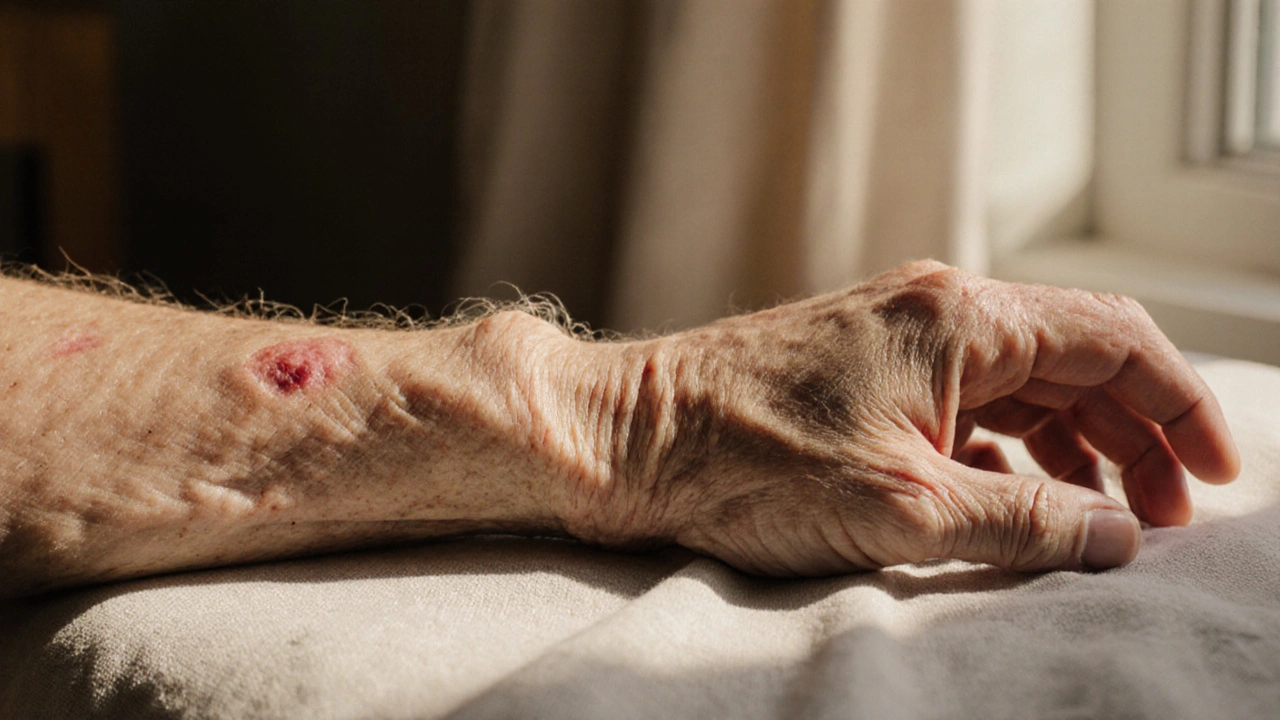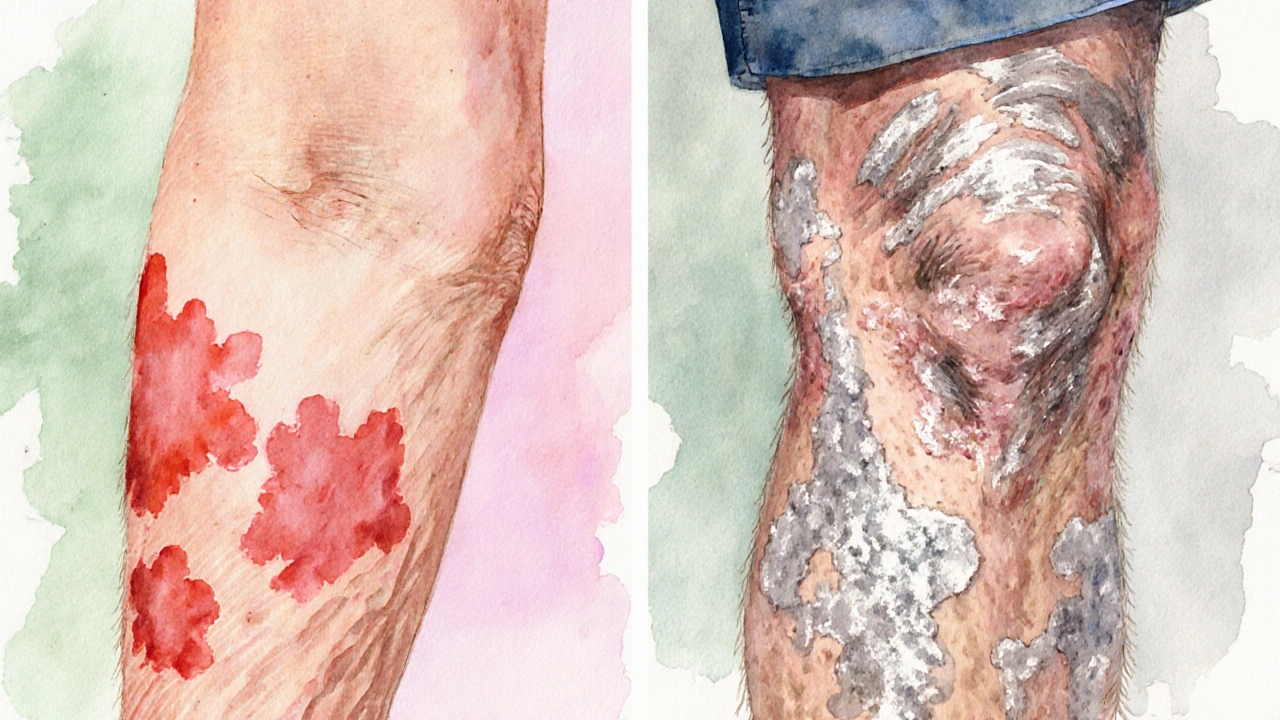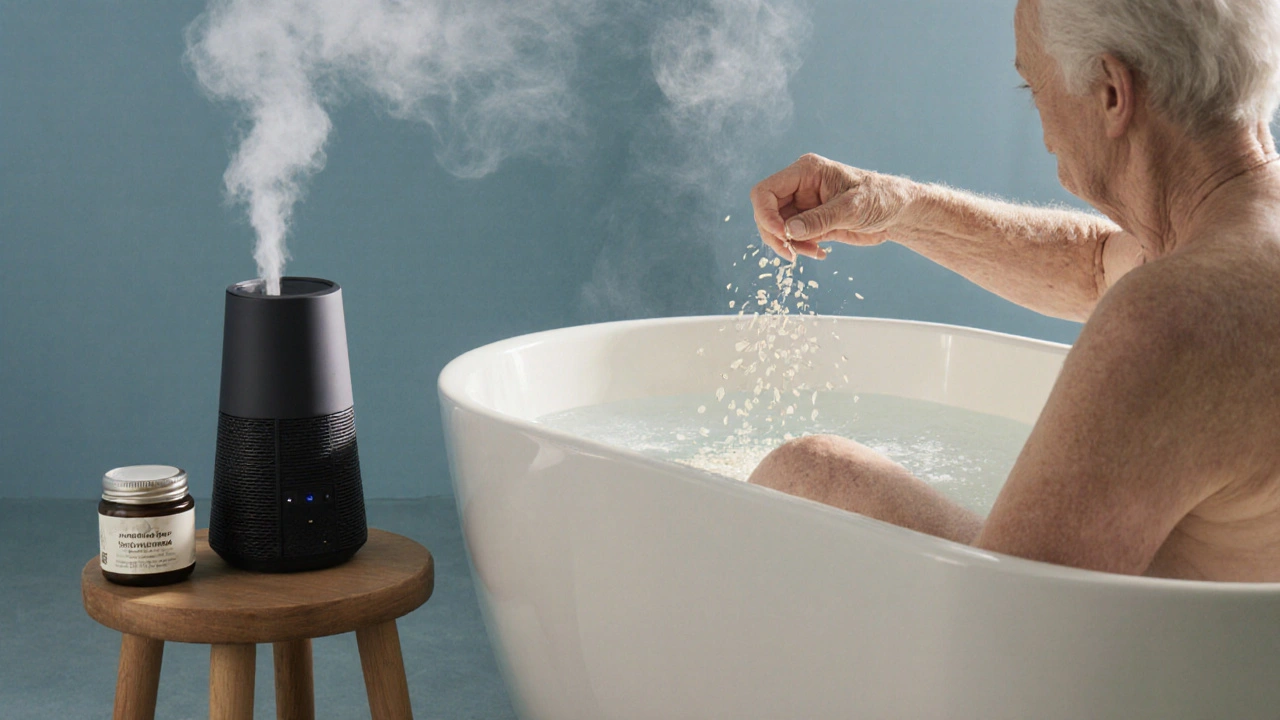
Elderly Itching Cause Identifier
Potential Causes Identified
Recommended Relief Methods
Important Symptoms to Watch For
When we talk about itching in the elderly as a frequent, often distressing symptom that affects older adults, we’re really looking at a range of skin and health issues that become more common after age 65. The good news? Most of the time you can narrow down the cause and find simple, low‑cost ways to calm the scratchy feeling. Below you’ll get a step‑by‑step rundown of why the skin gets itchy, which conditions to watch for, and practical tips you can start using today.
Why the Senior Skin Gets Itchy
Age brings changes in skin structure: the outer layer thins, oil production drops, and the skin’s barrier becomes less efficient. These shifts mean moisture leaks faster and irritants slip through more easily. Add in chronic illnesses, medications, and lifestyle habits, and you have a perfect storm for itching in the elderly.
Dry Skin (Xerosis) - The Most Common Culprit
Dry skin is the leading cause of itchiness in seniors, arising from reduced sebaceous gland activity and lower humidity levels in homes. When the skin can’t hold on to water, it feels tight, flaky, and itches like mad.
- Look for visible flakes, rough patches, or a sensation of tightness after a shower.
- Use a fragrance‑free moisturizer within three minutes of bathing-this traps water in the skin.
- Consider a humidifier set to 30‑40% humidity during winter months.
Eczema and Psoriasis - Inflammatory Skin Conditions
Eczema is a chronic, inflamed skin condition that causes red, itchy patches, often worsened by dry skin or allergens. In seniors, it may appear on the hands, face, or legs.
Psoriasis is an autoimmune disorder that speeds up skin cell turnover, leading to thick, silvery scales that itch intensely. It often shows up on elbows, knees, and scalp.
Both conditions respond well to:
- Gentle, soap‑free cleansers.
- Topical steroids or non‑steroidal anti‑inflammatory creams prescribed by a doctor.
- Regular moisturising to keep the barrier repaired.

Fungal Infections - Hidden Itch Triggers
Fungal infection is often caused by Candida or dermatophytes, thriving in warm, moist areas like between toes or under skin folds. Seniors may develop an itchy rash that looks red and scaly.
Treatment tips:
- Keep affected areas clean and dry.
- Apply over‑the‑counter antifungal creams (e.g., clotrimazole) for two weeks.
- If it spreads or stays stubborn, see a GP for oral antifungal medication.
Systemic Health Problems That Spark Itch
Sometimes the itch originates inside the body, not on the surface. Key systemic triggers include:
- Diabetes is a condition that can cause dry skin and poor circulation, both of which heighten pruritus. Uncontrolled blood sugar also raises infection risk.
- Liver disease is especially cholestasis, which leads to bile salts depositing in the skin and causing severe itching.
- Kidney disease is known for uremic pruritus, a persistent itch linked to toxin buildup.
- Thyroid disorders are another hidden cause; hypothyroidism slows skin turnover, leading to dryness and itch.
If you suspect an internal condition, a blood test panel (liver enzymes, renal function, thyroid hormones, HbA1c) can pinpoint the culprit.
Medication Side Effects - The Unexpected Itch
Many seniors take multiple prescriptions, and several common drugs list itching as a side effect:
- Statins (cholesterol‑lowering)
- ACE inhibitors (blood pressure)
- Opioids and certain pain relievers
- Antihistamines (paradoxically, some first‑generation types can dry out the skin)
If a new medication coincides with the start of itching, talk to the prescriber. Switching to an alternative or adjusting the dose often clears the problem.
Everyday Triggers to Keep an Eye On
- Hot showers or baths - the steam strips natural oils.
- Tight clothing made of wool or synthetic fibers that can rub the skin.
- Seasonal changes - winter dryness, summer sweat.
- Allergens in laundry detergents or body washes.
Simple tweaks-lukewarm water, cotton garments, fragrance‑free products-can cut down on irritation.

Practical Relief Strategies That Work
Below is a quick‑reference table pairing common causes with the most effective soothing measures.
| Cause | Top Relief Method | Additional Tip |
|---|---|---|
| Dry skin | Thick, fragrance‑free moisturizer (e.g., ceramide cream) | Apply within 3 minutes of bathing |
| Eczema | Prescription topical steroid or calcineurin inhibitor | Short‑term use; pair with moisturiser |
| Psoriasis | Vitamin D analog (e.g., calcipotriene) or steroid | Consider phototherapy for severe cases |
| Fungal infection | Topical antifungal (clotrimazole 1%) | Keep area dry; change socks daily |
| Medication side‑effect | Consult doctor for alternative drug | Do not stop medication abruptly |
| Systemic disease (liver/kidney) | Treat underlying condition | Use gentle skin‑care while labs normalize |
Other top‑level home remedies that many seniors find soothing:
- Moisturiser is the cornerstone of itch relief; creams with urea, glycerin, or ceramides restore barrier function.
- Oatmeal baths - colloidal oatmeal (1 cup in warm water) reduces inflammation.
- Calamine lotion - a cool, drying agent for localized itch.
- Antihistamine tablets (e.g., cetirizine) - helpful when itching is allergy‑driven, but watch for drowsiness.
Red‑Flag Symptoms - When to Call a Doctor
Most itchiness can be managed at home, but seek medical attention if you notice:
- Sudden, severe rash with swelling or blistering.
- Itch accompanied by fever, weight loss, or night sweats.
- Persistent itching that night‑time interferes with sleep for more than two weeks.
- Signs of infection: warmth, pus, or foul odor.
Early diagnosis can prevent complications, especially when the itch signals an internal disease.
Quick Checklist for Seniors
- Check skin daily for dryness or new rashes.
- Moisturise right after bathing - at least twice daily.
- Review medication list with your GP; ask about itch side‑effects.
- Keep nails trimmed to avoid skin damage from scratching.
- Stay hydrated - aim for 6‑8 glasses of water a day.
Frequently Asked Questions
Why does my skin feel itchier in winter?
Cold air holds less moisture, and indoor heating strips natural oils. The skin barrier weakens, letting irritants trigger nerve endings. Using a humidifier and a richer moisturizer can offset the dryness.
Can my blood pressure medicine cause itching?
Yes, ACE inhibitors and some diuretics list pruritus as a side effect. If the itch started after beginning the drug, ask your doctor about a possible switch.
Is it safe to use over‑the‑counter hydrocortisone creams?
For short‑term, mild flare‑ups, a 1% hydrocortisone cream applied twice daily is generally safe for seniors. Avoid using it on large body areas for more than two weeks without medical guidance.
What home remedy works best for an itchy scalp?
An oatmeal‑based shampoo or a diluted apple‑cider‑vinegar rinse (1 part vinegar to 4 parts water) can calm inflammation and reduce fungal growth.
Should I scratch my itch to get relief?
Scratching provides short‑term relief but damages the skin barrier, leading to more itching and possible infection. Try a cool compress or a moisturizer instead.
Can stress make my skin itch?
Stress releases histamines and cortisol, both of which can heighten skin sensitivity. Practising relaxation techniques-deep breathing, gentle yoga, or short walks-often reduces itch intensity.
Comments (17)
-
Matt Tait October 7, 2025
If you're still using that generic moisturizer, you're basically inviting a skin disaster.
-
Benton Myers October 8, 2025
Moisturizing right after a shower helps lock in the water.
-
Pat Mills October 8, 2025
The epidermal barrier in seniors is like an ancient fortress weakened by time.
When that barrier erodes, nerve endings become exposed to the slightest whisper of irritation.
Dry air, hot showers, and even the subtlest scratch can ignite an inferno of itching that seems endless.
Moreover, systemic conditions such as diabetes or liver disease act as unseen saboteurs, further destabilizing the skin’s defenses.
A well‑timed moisturizer, especially one rich in ceramides and urea, acts as a tactical sealant, restoring the wall’s integrity.
Applying it within three minutes of bathing traps moisture before it evaporates, a fact supported by multiple dermatological studies.
For those battling eczema, a low‑potency steroid applied sparingly can quiet the inflammatory blaze without burning the skin.
Psoriasis sufferers may find relief in vitamin D analogues or phototherapy, which recalibrate the immune response.
If a fungal culprit is suspected, an over‑the‑counter antifungal cream used consistently for two weeks can eradicate the pathogen.
Medication reviews are indispensable, because drugs like ACE inhibitors or statins can masquerade as pruritic villains.
Simple lifestyle tweaks-lukewarm showers, cotton garments, and humidifiers set to thirty percent-prevent the skin from drying out further.
Hydration from within matters too; six to eight glasses of water daily keep the epidermis supple.
Keeping nails trimmed reduces the risk of secondary infection caused by aggressive scratching.
Should the itch persist for more than two weeks, especially at night, it signals a red‑flag that warrants prompt medical evaluation.
Ultimately, a holistic approach that combines barrier repair, judicious medication, and systemic health monitoring offers the most sustainable relief.
-
neethu Sreenivas October 9, 2025
I totally get how relentless itching can wear you down 😔
Thinking about it, the skin barrier is like a metaphorical shield that needs constant care.
Using a fragrance‑free moisturizer right after a warm shower can be a simple yet profound act of kindness toward yourself 🌿.
Also, a gentle oatmeal bath can soothe inflammation without stripping natural oils.
Remember to keep a daily routine; consistency is the quiet hero in the battle against itch.
Stay hydrated, and don’t hesitate to discuss any new medications with your doctor – sometimes a tiny tweak makes all the difference 🙏.
-
Keli Richards October 9, 2025
Moisturizing twice daily especially after baths really helps the skin stay soft and less itchy its a simple habit that pays off quickly.
-
Ravikumar Padala October 10, 2025
Honestly the whole “apply moisturizer within three minutes” advice feels like a marketing gimmick more than science though some studies do mention it.
People keep overcomplicating what is essentially a basic need to keep skin hydrated.
Sure, using a thick cream might feel nice but the real issue often lies deeper in systemic problems that get ignored.
Doctors should focus on liver and kidney function tests before pushing endless tubes of ointments.
And let’s not forget the role of diet – too much sugar can worsen dryness and itching.
While we’re at it, the article could have mentioned the importance of wearing breathable fabrics rather than just “cotton”.
All those little lifestyle tweaks add up and many seniors miss them because they’re presented as after‑thoughts.
Bottom line: moisturizer is just a band‑aid if the underlying health isn’t addressed.
-
King Shayne I October 11, 2025
Look, if you keep slapping on any old cream you’ll just mask the problem and waste money. Real relief comes from cnsulting a doc about meds that might be the cause. Don’t ignore the possiblity of an allergic reaction to something you cant even remember putting on.
-
jennifer jackson October 11, 2025
Stay positive keep moisturising you’ll feel better soon.
-
Brenda Martinez October 12, 2025
What a naïve oversimplification! Suggesting a simple oatmeal bath as if it were a cure‑all betrays a complete lack of understanding of pruritic pathophysiology. The elderly deserve comprehensive evaluations, not just feel‑good tips.
-
Marlene Schanz October 12, 2025
Hey all, just wanted to add that a daily routine of mild, fragrance‑free cleanser followed by a ceramide‑rich lotion can really make a difference. Also, keep an eye on humidity levels in your home – a small humidifier set low can prevent that tight feeling after showers. If you notice persistent rashes, a quick visit to your GP for a skin panel is worth it.
-
Matthew Ulvik October 13, 2025
Totally get it – meds can be a sneaky itch trigger. Chat with your doc, maybe they can switch you to something gentler :)
-
Dharmendra Singh October 13, 2025
It is essential to review any new prescriptions with your healthcare provider because many common drugs, such as ACE inhibitors or certain antibiotics, list pruritus as a side effect. A thorough medication audit can often pinpoint the culprit and allow for an alternative to be prescribed, reducing the need for additional topical treatments.
-
Rocco Abel October 14, 2025
While the mainstream advice touts moisturizers and oatmeal baths, the real hidden agenda lies in the pharmaceutical industry pushing expensive creams to keep us dependent. Independent research suggests that simple lifestyle changes, like diet and ambient humidity, are far more effective yet receive no funding.
-
Dawn Mich October 15, 2025
Don't be fooled by the polite tone of the article – it's a veiled propaganda piece designed to sell you over‑the‑counter products while ignoring the systemic toxins building up from government‑mandated chemicals in our water supply that are the true itch drivers.
-
Eric Sevigny October 15, 2025
It might be useful to consider a balanced diet rich in omega‑3 fatty acids, as they can help improve skin barrier function and potentially lessen itching over time.
-
Glenda Rosa October 16, 2025
Oh, please! The whole “apply moisturizer within three minutes” credo is just another fad. I've seen patients thrive with a simple olive oil rub at night, and the medical community’s obsession with synthetic creams is downright comical.
-
charlise webster October 16, 2025
While the checklist is thorough, one could argue that focusing too much on topical solutions detracts from addressing underlying metabolic issues, which often are the primary itch drivers.
